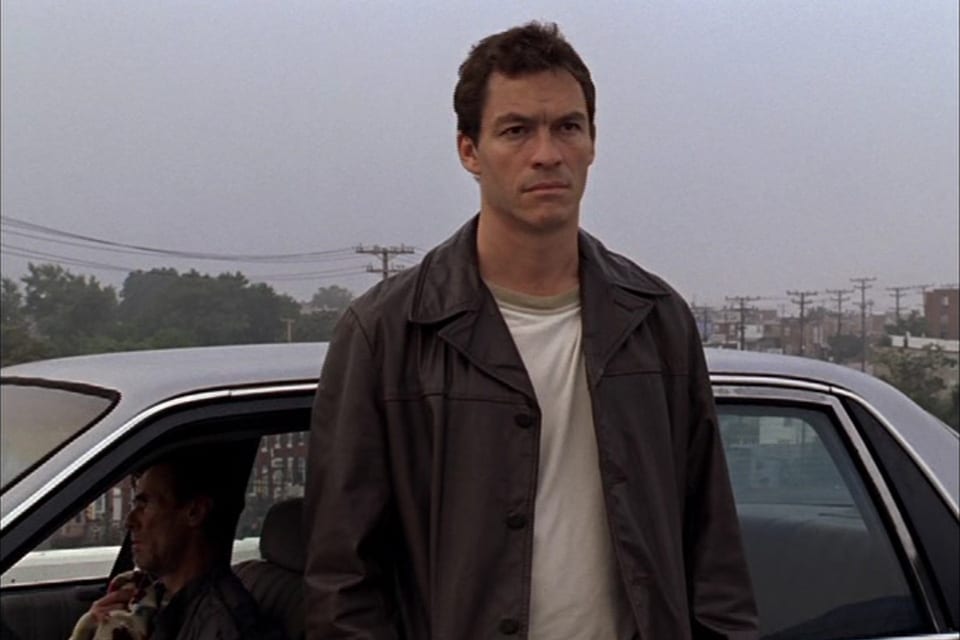Revisiting The Wire’s Finale “-30-“
Written by Ian Thomas Malone, Posted in Blog, TV Reviews
Season five of The Wire was always going to be a tall order under the best of circumstances. HBO’s finest series to date had its final season order slashed by three episodes, putting immense strain on its ever-expanding cast. The inclusion of the Baltimore Sun newsroom fit the series’ habit of shining a spotlight on new elements of the city’s culture each year, albeit with a cast of characters inevitably destined to pale in comparison to the schoolchildren who carried season four.
Television has no shortage of terrible series finales. Some play too hard for shock value, betraying their core ethos in the process. Others simply leave a bad taste in one’s mouth. Any finale that doesn’t make one recoil with disgust should be considered a win.
As far as finales go, “-30-” is hardly one for the ages, not exactly a sentiment one may want to be attached to one of TV’s crowning achievements. The final episode of The Wire deserves a lot of credit for being among the more effective finales in the television medium, providing closure for much of its massive cast while reminding viewers why they fell in love with the show in the first place.
The Wire is not an optimistic show, constantly shining a light on government incompetence and corruption. Good rarely triumphs over evil, not where apathy and bureaucracy can wear down even people with the best intentions. Lester Freamon and Bubbles spent much of season five on opposite ends of the spectrum with regard to this dynamic, one fed up with the nonsense getting in the way of his investigative prowess, while the other struggled to rise above a world that had kicked him while he was done so many times.
“-30-” understands its duty to wrap up a series, not necessarily the ideas it put forward. Baltimore may not change, but the characters who made the series so special carry with them concrete senses of growth. Perhaps none more than Cedric Daniels, constantly forced to balance his no-nonsense attitude toward police work with the politics associated with his ambition. Seeing Daniels survive all of McNulty’s crap to become police chief would’ve made for a happy ending. Perhaps too happy.
Instead, The Wire split the difference. Daniels leaves the department with his dignity intact, forgoing the top job in service to his own sanity. Returning to criminal litigation, Daniels emerges from the events of the series a better man, allowing swamp creature Stan Valchek to enjoy the perks of doing the mayor’s dirty work.
As a whole, season five buckled under the weight of the series’ ambitions, delivering the show’s silliest casework for what was left of the Major Crimes Unit. McNulty’s serial killer story was bound to end poorly, but the show struggled to paint this outcome as anything other than inevitable. For all his careful concern toward policework, Freamon never had a reasonable endgame.
-30- puts this all in perspective, to an extent. Marlo Stanfield walked because the Baltimore Police Department wasn’t willing to put the basic resources together to catch him. Dozens of bodies left in his wake, the bureaucracy lets him walk free, instead merely nabbing his lieutenants. That’s not justice in any sense of the word, but The Wire wasn’t really about that.
Catching Marlo would leave the impression that detectives could actually succeed in pushing the never-ending boulder up the hill to bring about real change. There’s a reason arrests were few and far between after the triumphs of season one’s wiretap. Real change isn’t easily boxed into the sense of dramatic payoff that finales are expected to produce.
Characters like Stringer Bell, Prop Joe, and Bunny Colvin tried to change the rules of the game, but the game pushed back at every turn. Strong-willed people are no match for systemic rot. Those who try and cheat the system for noble purposes like McNulty fare no better. Only the shamelessly selfish like Tommy Carcetti, Clay Davis, and Maurice Levy get ahead. American capitalism at work. The game is the game.
-30- leaves us with little hope at the end, but David Simon deserves a lot of credit for his compassionate approach toward the audience. Hearts may break at the sight of Duquan shooting heroin, emulating an earlier Bubbles, or Michael morphing from quiet introvert to the heir to Omar’s throne, but the show let up a little bit, giving Namond a chance to shine in a late-season five cameo. Bubbles, the heart and soul of the show, ends the narrative with hope for perhaps the first time.
Simon also takes the chance to honor the characters who made the show so special. McNulty’s destructive behavior had gotten a little tiresome by season five, exacerbated by his sincere rehabilitation efforts the previous year. The “wake” held in his honor doubles as an opportunity to eulogize a show that was often the best thing on television.
The Wire wasn’t afraid to be gentle while laying out a bleaker truth for its viewers, delivering one of the more satisfying finales in television history. It shouldn’t be satisfying. The world that The Wire shined a light on is so infuriating and hopeless.
There are lingering thoughts brought about by the truncated final season, which followed two straight seasons of top-notch television. Some characters, like Kima Greggs, definitely get the short end of the stick as a result. -30- isn’t a hopeless finale, instead putting the past five years in perspective in a way that manages to bookend a series that grew far bigger than itself. As far as TV endings go, it’s hard to think of a better note that The Wire could’ve realistically ended on.











